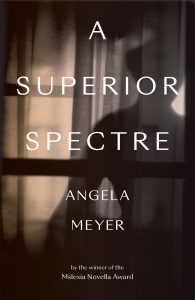On Writing: Angela Meyer
 On the plane on the way over to the UK for my book tour I watched a beautiful Scottish film called Tell it to the Bees. While it was essentially a story of both love (between two women) and friendship (between adults and children), there were gut-wrenching scenes of oppression.
On the plane on the way over to the UK for my book tour I watched a beautiful Scottish film called Tell it to the Bees. While it was essentially a story of both love (between two women) and friendship (between adults and children), there were gut-wrenching scenes of oppression.
Women’s desires, their thoughts, their dreams, their abilities. There were scenes of physical restraint and violence done to them. It is set in the 1950s.
I have been thinking a lot about my grandmothers. One, who had eight children and was confident and independent in her old age, after her husband died – dating, doing community theatre, writing, and being involved in the lives of her children and grandchildren. The other, who had a hard life and an alcoholic, violent husband. Who, into old age, found it difficult to have any sense of self worth.
How I loved them both so deeply, and have aspects of each of them inside me.
It would seem strange to anyone reading A Superior Spectre that I didn’t set out to write a feminist novel. A book about a man from the future invading the mind of a young woman in the past. I always did know it was about empathy – how we find it challenging to truly go into the mind of another person and feel what they feel.
The reader is challenged to sit in the mind of Jeff, the ‘villain’ of the story, while he is living in the mind of the hero. I realised it was a feminist novel when I started to feel that Jeff never really could stretch to understand Leonora, despite a literal empathic experience. That he viewed the harm he had done to all the women in his life fairly nonchalantly compared to the shame he carries about the effect he may have had on boys and men.
While he is the ‘villain’ in a story sense, he is not unsympathetic. He is very much a product of his culture, of patriarchal capitalism. Where gender norms may be different and more progressive than in the 1950s, but still exist (and divide). As in Tell it to the Bees, all of the characters are socialised to adhere to social norms. And we police each other, though we often do not realise we are doing it.
Women often say to me ‘I wish I was brave enough to have your haircut’ (I have an undercut). Men frequently say to me, ‘You like whisky? That’s interesting.’ You see how neither of these comments is offensive (and I do not take them as such) but they remind me that I am not performing the gender narrative as it is conventionally understood.
My cousins just the other day talked about my Oma, my Dutch grandmother, how she would put on a silver suit to go out and meet her younger boyfriend. He was still married, they say. (I don’t remember that.) It’s more complex than this, and my cousins did know her better than me, as they are older, but I was thinking about how at least partly, my Oma was not performing an appropriate idea of ‘grandmother’… It has always thrilled me to learn of both my grandmothers’ discretions, and autonomous acts.
I wanted to write a hero who was happy, curious, autonomous, until the conflict… I wanted her to know herself, not ‘find’ herself. I think this is often the case. Things we know as children or teenagers, some instinct about ourselves and the world, is overridden by social messaging. This is worth exploring whether it is the 19th Century, the 1950s, or now.
Lately, I have been drawn to books about characters pushing, questioning the dominant patriarchal capitalist view, set in a range of time frames. I often like the narratives where this is played out in a small space. The largeness is in the minds and bodies of these characters. The small space of the car in Carrie Tiffany’s Exploded View. The getaway cottage in Miren Agur Meabe’s A Glass Eye. The Writing Shed in Deborah Levy’s The Cost of Living. A garden at the edge of a post-apocalyptic city in Katie Hale’s My Name is Monster.
A good book, or film, expands for us the idea of just how much can be contained inside a person, including ourselves, and makes us think about how each person bumps up against the world, their time. Makes us think more deeply about how we do. How our grandparents did. Hopefully, it helps us find our own reserves of strength, while helping us meet the world, meet others, openly. I know that I not only love stories, but need them, because of this.
—
Angela Meyer’s Joan Smokes won the inaugural Mslexia Novella Competition in 2019. Her short fiction has been widely published, including in Best Australian Stories, Island, The Big Issue, The Australian, The Lifted Brow and Killings. By day she works as a publisher for Echo Publishing, an Australian imprint of Bonnier Books UK, and in this role has discovered and developed a range of award-winning, globally published and bestselling talent, including global number one bestselling author Heather Morris. A Superior Spectre, Angela’s debut novel, is already shortlisted for a number of prestigious awards.
A SUPERIOR SPECTRE
 Jeff is dying. Haunted by memories and grappling with shame, he runs away to a remote part of Scotland with a piece of beta tech that allows him to enter the mind of someone in the past. Instructed to only use it three times, Jeff – self-indulgent, isolated and deteriorating – ignores this advice.
Jeff is dying. Haunted by memories and grappling with shame, he runs away to a remote part of Scotland with a piece of beta tech that allows him to enter the mind of someone in the past. Instructed to only use it three times, Jeff – self-indulgent, isolated and deteriorating – ignores this advice.
In the late 1860s, Leonora lives in the Scottish Highlands, surrounded by nature. Contemplating the social conventions that bind her, her contented life and a secret romantic friendship with the local laird are interrupted when her father sends her to stay with her aunt in Edinburgh. But Leonora’s ability to embrace her new life is shadowed by a dark presence that begins to lurk behind her eyes, and strange visions.
A Superior Spectre is a novel about curiosity, entitlement and manipulation. It reminds us that the scariest ghosts aren’t the ones that go bump in the night, but those that are born and create a place for themselves in the human soul…
Category: Contemporary Women Writers, How To and Tips

























